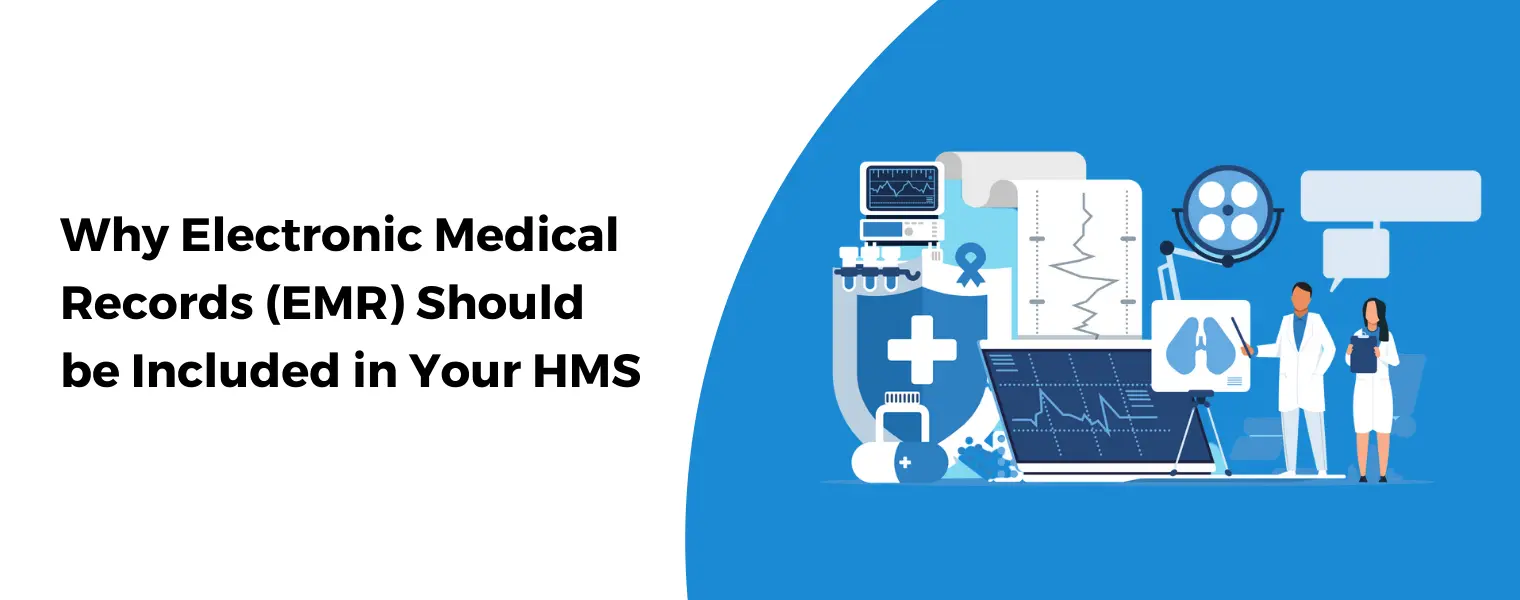
Medical practices of all sizes and specialties have been adopting medical software to manage their patients and providers throughout the last decade. As a result, the advantages of electronic medical records (EMR) are becoming more widely recognized, and EMR software use is increasing. Operational, financial, and clinical aspects of hospital management are all covered by Hospital Management Software (HMS). Most hospital management software only addresses operational and financial issues such as billing, inventory management, patient registration, scheduling, and workflow management. When evaluating HMS software, hospitals place a greater emphasis on operational and financial factors while placing less emphasis on clinical records.
EMRs are electronic medical records that contain standard medical and clinical data from a single provider's office and are mostly utilized by doctors for diagnosis and treatment. Both large and small healthcare facilities benefit from EMR systems' interfaces and functionalities. They're used to track patient health data, manage payments, process insurance claims, schedule patient visits, add new patients, and exchange information. In most cases, medical history, doctor's notes, diagnosis, test findings, medications, allergies, and immunization dates are given. Treatment and diagnosis are based on conventional clinical and medical data from a provider's office, which is stored online. The correct documentation of a patient's medical history reduces diagnosis errors and aids in the administration of appropriate care. In the 1960s, doctors began recording patients' health concerns rather of only their medications, which prompted the development of EMR. Third-party vendors can easily check diagnoses using this way. As computers and the internet became increasingly ubiquitous, digitally transferring and documenting medical records became required.
Medical records contain fewer mistakes
Patients can be seen and treated more promptly by medical personnel
Data and outcomes are monitored over time
Better health diagnosis, treatment, and overall care quality
Determine which patients require preventive visits and screenings
Patient data privacy and security are improved
Patient error reduction and improved patient care
At the point of care, enable evidence-based decisions
Following a visit, self-care instructions, reminders for more follow-up care, and access to online resources are all provided
Patients' own data can be accessed to view drugs and track lifestyle changes that have improved their health
Save space by removing the need to keep, manage, and retrieve paper records
Increased number of patients serviced per day and improved process
Reduce administrative burdens and operating costs
Easily communicate with hospitals, pharmacies, laboratories, and state health systems
Electronic records that are customizable and scalable
Collect and evaluate patient data in order to reach out to certain groups
Provide clinical reminders and warnings
Documentation and coding could be improved
Improve clinical quality by increasing research and monitoring
Provide built-in protections against prescribing therapies that could cause harm
Follow up on electronic messages sent to staff, other professionals, hospitals, labs, and other entities
Links to public health systems like registrations and databases on communicable diseases
With EHR, you can rapidly access any vital information about patients, such as allergies, disease diagnoses, medications, lab test results, and so on. This gives the custodian or minder a clear notion of how to proceed with treatment
People who care for patients are given many options for patient care, which will definitely increase the effectiveness of care and the safety of patients by allowing them to quickly access past and new test findings
The computerized EMR system employs prompts, reminders, and alerts to provide a variety of benefits, including improved compliance, the ability to conduct regular screenings, and the ability to use other vital methods, natural treatment and diagnosis, and the ability to precisely identify drug interactions, among others
Improved care continuity, improved timeliness of illness treatment and diagnosis, lower event frequency, and other essential benefits provided by the Electronic Medical System for secure, efficient, and accessible communication between patients and clinicians.
Patients can control their diabetes and other chronic conditions using the different tools supplied to them, such as quick access to their health records at any time, interactive health tables and patient education, self-testing and home monitor methods, and so on.
The electronic medical record (EMR) is a holistic solution for the prevention, diagnosis, treatment, care, and management of medical issues. It is a complete ecosystem with a variety of integrations.
Through the patient's current health state and medical history, the detailed history of the patients will aid in the search for a new health care provider. They also support sharing patient data with healthcare facilities even if the patients have not requested it.
Hospital Software by DoFort provides EMR system management software to easily manage healthcare organizations. To assist your hospital in going paperless and managing processes, DoFort Hospital Information System, EHR, and Hospital ERP are available.
Welcome to DoFort !